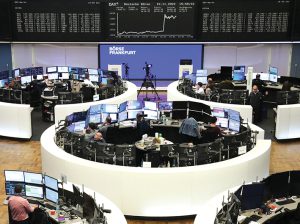BLOOMBERG
Bond yields across the euro region fell on Wednesday as worsening economic data and slowing inflation underscored expectations for interest-rate cuts next year.
Germany’s 10-year yield dropped below 2% for the first time in nine months after a report showed producer prices fell more than expected in November. The Stoxx Europe 600 index reversed an early gain to trade about 0.2% lower amid worries the region is heading for a recession.
The UK’s FTSE 100 benchmark outperformed, rising as much as 1.3%, after data showed inflation slowed more than analysts’ estimates in November, bolstering the case for a Bank of England pivot to rate cuts next year. The pound slumped to a three-week low and the yield on 10-year gilts retreated as much as 11 basis points.
Traders are betting that slowing inflation and softening economic growth will prompt the European Central Bank to start easing rates next year. Money markets are pricing in close to a 50% chance of an ECB rate cut by March next year.
A gauge of German business expectations released earlier this week surprisingly worsened in December, while euro-area PMIs contracted for a seventh month. Analysts surveyed by Bloomberg forecast the region to enter its first recession since the pandemic. At the same time, euro-area inflation continues to decelerate, reaching 2.4% in November from a peak above 10% last year,
US equity futures fell after the Nasaq 100 reached another record. Treasury 10-year yields slipped five basis points to 3.89%.
Speculation of Fed easing is making investors the most optimistic since the beginning of 2022, a Bank of America Corp survey showed. Traders have also been liquidating bets on higher short-term US yields as investors reel back from the urge to fight the dovish pivot.
Richmond Federal Reserve President Thomas Barkin reinforced the more dovish tone, suggesting the US central bank would lower interest rates if recent progress on inflation continued. However, other policymakers have pushed back more aggressively against rate cut bets. Chicago Fed President Austan Goolsbee and the Cleveland Fed’s Loretta Mester suggested that the expectations were premature.
Investors are waiting for data readouts from the US, including Wednesday’s existing home sales, Thursday’s third quarter gross domestic product print and Friday’s durable goods orders and personal consumption expenditures — the Fed’s preferred measure of inflation — to firm up their rate bets.
Japan’s benchmark government bond yield fell to the lowest since the Bank of Japan tweaked yield curve control in late July. Meanwhile, the Nikkei 225 stock gauge rose to the highest in more than five months after the central bank kept investors in the dark on when it may adjust policy. The yen gained for the first time in four days. Oil was little changed after two days of gains, as traders and shippers braced for the prospect of more disruption in the Red Sea. Gold was also steady.
 The Gulf Time Newspaper One of the finest business newspapers in the UAE brought to you by our professional writers and editors.
The Gulf Time Newspaper One of the finest business newspapers in the UAE brought to you by our professional writers and editors.
